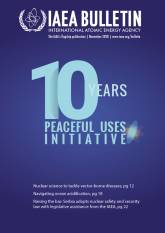
If you would like to learn more about the IAEA’s work, sign up for our weekly updates containing our most important news, multimedia and more.
The Future of the Peaceful Uses Initiative: Responding to Global Challenges and Emergencies
Rebekka Koelbl

Accelerating and enlarging the “contribution of atomic energy to peace, health and prosperity throughout the world” is a statutory objective of the IAEA. For ten years the Peaceful Uses Initiative (PUI) has contributed to this objective, proving to be effective in mobilizing extrabudgetary contributions toward peaceful applications of nuclear technology.
What is next? How will the PUI evolve in the coming years?
The world faces complex developmental challenges, such as zoonotic outbreaks, climate change and environmental pollution, among others, to which nuclear technologies can offer solutions and for which governments are seeking the support of the IAEA. Today’s complex global challenges increasingly call for large-scale, integrated responses, programmes and initiatives that are thematically overarching and strategically designed.
Early response to zoonotic outbreaks
This year, the world has witnessed an unprecedented global emergency in the COVID-19 pandemic, and reverse transcription–polymerase chain reaction (RT–PCR), a nuclear-derived technique used for detecting the virus that causes COVID-19, has been instrumental in fighting it. As part of its largest technical cooperation project, the IAEA has helped to provide over 120 countries with expertise and equipment. In addition to the immediate emergency response, it is essential that experts worldwide have the capacity to detect and characterize diseases at an early stage, before an outbreak can emerge.
Zoonotic diseases affect around 2.6 billion people every year. Nuclear and nuclear-derived techniques can help scientists to investigate, prevent and contain outbreaks of zoonotic diseases. Worldwide access to spatial and temporal data on animal pathogens and diseases can help facilitate swift decision making and support veterinary and health authorities in responding in a timely manner and disseminating information to relevant stakeholders. To prepare for future outbreaks, national experts will benefit from coordinated research activities to better understand and address how zoonotic diseases impact human health.
To address this need and prevent future outbreaks, the IAEA has launched the Zoonotic Disease Integrated Action (ZODIAC) project, a comprehensive, multisectoral and multidisciplinary global initiative to enhance the surveillance, monitoring and timely detection of pathogens causing zoonotic diseases. The Veterinary Diagnostic Laboratory (VETLAB) Network, supported for years through PUI funding, will provide the basis for a new expanded laboratory network under ZODIAC. (For more on the VETLAB Network, read our article here.)

Real time RT-PCR is the most accurate method to detect the COVID-19 virus. The IAEA has been helping countries use this technique to detect zoonotic (animal to human) diseases like COVID-19 and Ebola. (Photo: D. Calma/IAEA)
Fighting plastic pollution
Plastic pollution is increasing at an alarming rate, threatening ecosystems, jeopardizing food safety, and endangering human health and sustainable development. In 2018, global plastics production reached almost 360 million tonnes, and every year about 8 million tonnes of plastic waste finds its way into the oceans.
Nuclear technologies have the potential to complement conventional approaches to reduce plastic waste. Irradiation can be used to modify the structure and properties of plastic or to break it down to create feedstocks. In both cases, the modified or functionalized new material or feedstock is used to produce commercially viable plastic items, thus creating economic benefits while reducing waste volumes.
Recycling plastic into new products using radiation technologies is particularly beneficial when primary recycling of plastic waste is no longer possible, as many thermoplastics can only be recycled once or twice with conventional technology.
Furthermore, nuclear techniques can be used to characterize, monitor, trace and track microplastics to assess their prevalence and their impact on the environment, including in the oceans.
Dealing with climate change
To comply with international agreements and keep global temperature rise below two degrees Celsius above pre-industrial levels, the energy sector must be decarbonized.
In the meantime, changing weather patterns are affecting agricultural systems, the global food supply and the livelihoods of small-scale farmers. Some of the most pressing effects of climate change already being felt are food shortages, water scarcity and biodiversity loss. The IAEA will play an increasingly important role in helping countries measure and adapt to the consequences of climate change using nuclear and isotopic techniques.
The IAEA will also continue to help mitigate climate change by assisting countries in assessing the development of their energy systems and the role nuclear power could play in generating electricity. Innovations in nuclear energy can assist countries in moving toward a clean energy transition, and nuclear power can complement renewables such as wind and solar power. Projects and programmes to help Member States operate nuclear power safely, sustainably and cost-effectively using innovative technologies will continue to be an important part of the IAEA’s work supported by PUI funds.
Modernizing research laboratories
The renovation and modernization of the IAEA’s nuclear applications laboratories in Seibersdorf, Austria, have received support from the PUI, and this is expected to continue in the years to come. Three new laboratories will be built to better serve the evolving needs of Member States, providing lab services and training in food and agriculture, human health, the environment, and the development and use of neutronic instruments (see our article here).
Safety of radioactive sources and nuclear material
The use of nuclear technology requires strong nuclear safety and security regulation and infrastructure at the national level. International cooperation through the harmonization of approaches in, for example, transport safety and security, radioactive waste management safety, and emergency preparedness and response provides tangible benefits to countries, using nuclear applications for development. PUI funding complements the Agency’s programme on the safety of radioactive sources and further improves the effectiveness of national systems using these technologies.
With the support of partners from the public and private sectors, this decade can take the PUI to the next level in its capability to maximize the IAEA’s impact on solving global challenges through the use of nuclear technologies.





